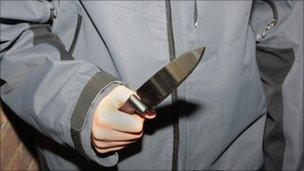Homicide rate in Scotland increases by 19%
- Published

Knives are still involved in more than half of murders in Scotland
Scotland's homicide rate has risen by 19% in the past year.
Figures published by the Scottish government revealed there were 95 homicides in the year to the end of March - up from 78 in 2009-10.
But the figure is still the third lowest in the past 11 years. Almost two-thirds of murder victims died as a result of knife crime.
There were 77 male homicide victims which was 79% of the total number of victims recorded.
The Strathclyde Police force area, which contains 43% of Scotland's population, accounted for 64% of all homicides - which include murders and cases of culpable homicide - recorded in 2010-11.
Most people accused of homicide were under the influence of alcohol or drugs (79% of cases), with more than half under the influence of alcohol (53% of cases).
In the vast majority of cases where the relationship was known, 88% were carried out by a person known to the victim.
In 2010-11, 61 homicide victims were killed by a sharp instrument, accounting for 63% of all victims recorded.
Justice Secretary Kenny MacAskill said: "Every single life lost is one too many and every murder is a horrific tragedy for families, loved ones and for communities.
"Although the murder rate is down by 30% since 2004/05, last year saw a rise from 2009/10.
"The statistics speak for themselves - most murders are carried out indoors, under the influence of alcohol or drugs, by someone known to the victim. These senseless acts are usually carried out by men, under the influence of cheap booze and drugs."
Mr MacAskill said the Scottish government was tackling the crime statistics by putting extra officers into communities, by investing £155m in tackling alcohol misuse and by introducing its alcohol minimum pricing bill.
"We will not shirk from taking tough action on alcohol abuse and we cannot allow this mindless violence, which has devastating consequences for families and communities across Scotland, to continue," he said.
He added: "Today's figures also show that the vast majority of killings involving knives are carried out indoors by perpetrators under the influence of alcohol or drugs, and not on our streets.
"Let me be crystal clear - tackling knife crime is an absolute priority for this government and Scotland's prosecutors and courts have my backing in using the full force of the law to punish anyone who carries or uses a knife.
"Tough enforcement backed by education is key to tackling knife crime.
"Ending Scotland's knife culture is not going to be an easy task - every incident or life lost, as these tragic cases show, is one too many. However, we are working hard to tackle the problem across the country and there will be absolutely no let up in our efforts."
Mr MacAskill added that overall crime was at its lowest rate for 35 years.
'Weapon of choice'
Responding to the statistical report, Labour's James Kelly said it was "deeply concerning" that knife deaths had increased by 74% "in the last year alone".
He added: "They now account for a greater proportion of killings in Scotland than at any point in the last decade.
"The SNP is quick to blame drink and drugs, which of course we must tackle, but that does not explain why knives, overwhelmingly, continue to be Scotland's weapon of choice.
"These statistics underline the need for the SNP government to place a renewed focus on tackling violent crime, especially knife crime, reducing reoffending and placing victims at the heart of the justice system again."
The Scottish Conservative's justice spokesman David McLetchie said it was time for a co-ordinated crackdown on knife crime.
He added: "Our courts should be handing out exemplary prison sentences to those who carry knives and use them to commit serious assaults and murders.
"This approach has worked in the past and can do so again. Too often those jailed for knife attacks are allowed out under early release and do not serve their full sentence. The SNP's soft touch policy on sentencing undermines our efforts to tackle this problem.